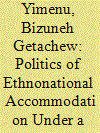| Srl | Item |
| 1 |
ID:
148949


|
|
|
|
|
| Summary/Abstract |
This article examines the relationship between the politics of ethnicity and road construction in Hawassa, Ethiopia. The Ethiopian state has recently invested unprecedented amounts of money in the construction of urban roads. These roads both undermine and reinforce longstanding ethnic hierarchies within Ethiopian cities. Contrary to the image promoted by the state of harmony among residents of different ethnic backgrounds, our research revealed a great deal of tension, particularly concerning the distribution of benefits from state-led infrastructural development. The experiences of residents in rapidly changing neighbourhoods, demonstrate that the benefits of recent road construction are not necessarily distributed according to the policies of the current regime. Instead, historical inequalities interact with contemporary urban development in ways that may actually disrupt the state's vision of unity through diversity. Stratification is built into the city and attempts to reshape the city necessarily interact with recent and long-standing inequalities.
|
|
|
|
|
|
|
|
|
|
|
|
|
|
|
|
| 2 |
ID:
193044


|
|
|
|
|
| Summary/Abstract |
Ethiopia is the most prominent example of the late 20th-century adoption of federalism to accommodate diversity and complete state-building. This article explores the implementation of federalism and accommodation of ethnonational diversity in dominant party regimes by using Ethiopia as a case. Drawing on legal documents, literature, news sources and government reports, the article argues that federalism enabled distinctive groups to promote their culture, use their languages and exercise self-rule in their territory. However, ethnonationalities’ constitutionally proclaimed self-determination rights and the practice rarely correspond. Although all ethnonationalities have the same constitutional rights, some are still subjugated, and self-rule remains their dream. The dominant party regime in Ethiopia met demands for self-rule and accommodation with suppression and violence. The constitution grants regions to use their legislative powers to accommodate region-specific demands; nevertheless, regions cannot operate out of the narrow framework of the federal ruling party. Thus, regions became repressive agents of the centre rather than genuine self-rule agents. Insights from Ethiopia have broader implications for states embracing federalism.
|
|
|
|
|
|
|
|
|
|
|
|
|
|
|
|